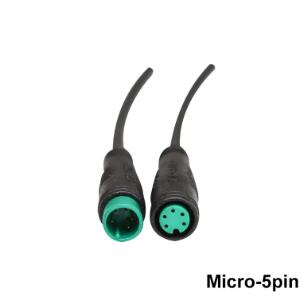Customizing CAN Signal Connectors: Meeting Specific Requirements
2024-07-16
Introduction
CAN (Controller Area Network) signal connectors are integral components in various industries, from automotive and industrial automation to aerospace and medical equipment. As technology advances and applications become more specialized, the need for customized CAN signal connectors grows. This blog explores whether CAN signal connectors can be customized for specific requirements and delves into how this customization is achieved.
Understanding CAN Signal Connectors
CAN signal connectors are used to facilitate communication between different electronic control units (ECUs) in a CAN network. They ensure reliable data transmission, signal integrity, and compatibility with CAN protocols. Standard CAN connectors come in various forms, including D-sub, M12, and RJ45 connectors, each with its unique features and applications.
The Need for Customization
Different industries and applications often have unique requirements that standard CAN signal connectors may not fully meet. Customization can address specific needs such as:
- Environmental Conditions: Harsh environments may require connectors with enhanced resistance to temperature extremes, moisture, dust, or chemicals.
- Form Factor: Space constraints or design considerations may necessitate connectors with specific shapes, sizes, or mounting options.
- Signal Integrity: High-speed data transmission or specific signal requirements may call for connectors with enhanced shielding, reduced crosstalk, or specific pin configurations.
- Compliance and Standards: Certain industries may require connectors that comply with specific regulatory standards or certifications.
How CAN Signal Connectors are Customized
1. Material Selection
The choice of materials is critical for connectors used in harsh environments or applications requiring high durability. Custom connectors can be made from materials such as:
- Metals: Stainless steel, brass, or other alloys for high strength and corrosion resistance.
- Plastics: High-performance plastics like PEEK or PTFE for chemical resistance and lightweight properties.
2. Custom Pin Configurations
Customizing the pin configuration allows connectors to meet specific electrical and signal requirements. This can include:
- Pin Count: Adjusting the number of pins to accommodate specific data or power transmission needs.
- Pin Layout: Designing custom pin layouts to reduce crosstalk, enhance signal integrity, or meet unique connection requirements.
3. Enhanced Shielding and Protection
To ensure signal integrity in environments with high electromagnetic interference (EMI), customized connectors can include enhanced shielding features:
- Shielded Cables: Using cables with additional shielding layers to protect against EMI.
- Shielded Housings: Designing connector housings with built-in shielding to reduce external interference.
4. Custom Form Factors
Space constraints or specific mounting requirements may necessitate unique connector shapes and sizes. Custom form factors can include:
- Compact Designs: Miniaturized connectors for applications with limited space.
- Special Mounting Options: Connectors designed for specific mounting orientations or embedded applications.
5. Environmental Sealing
For connectors used in harsh or outdoor environments, custom sealing options can enhance durability and reliability:
- Sealed Housings: Designing housings with IP67 or higher ratings to protect against dust and moisture.
- Gasket Seals: Incorporating gaskets or O-rings to provide additional sealing.
6. Regulatory Compliance
Customized connectors can be designed to meet specific industry standards and certifications, such as:
- Automotive Standards: Compliance with standards like ISO 26262 for automotive safety.
- Medical Standards: Adherence to medical device regulations for biocompatibility and sterilization.
Case Studies of Custom CAN Signal Connectors
Automotive Industry
In the automotive industry, custom CAN signal connectors are used in electric vehicles (EVs) to ensure reliable communication between battery management systems, motor controllers, and other ECUs. These connectors often feature enhanced shielding and ruggedized housings to withstand the automotive environment.
Industrial Automation
For industrial automation, custom CAN signal connectors can be designed with specific pin configurations and environmental sealing to ensure reliable operation in factory settings. These connectors may also include features like quick disconnect mechanisms for easy maintenance.
Aerospace Applications
In aerospace, custom CAN signal connectors must meet stringent weight and durability requirements. Connectors designed for aerospace applications often use lightweight materials and have enhanced resistance to vibration and extreme temperatures.
Conclusion
CAN signal connectors can indeed be customized to meet specific requirements across various industries. By selecting appropriate materials, designing custom pin configurations, enhancing shielding, creating unique form factors, and ensuring compliance with regulatory standards, manufacturers can provide tailored solutions that address the unique challenges of each application. As technology continues to evolve, the ability to customize CAN signal connectors will play a crucial role in enabling reliable and efficient communication in increasingly specialized and demanding environments.



